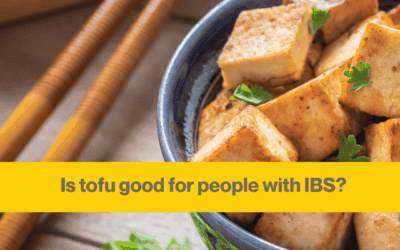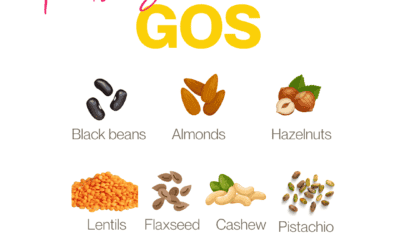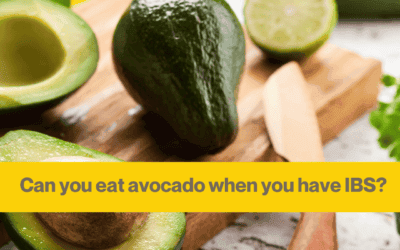An apple a day is supposed to be healthy, but what about if you have Irritable Bowel Syndrome? This post explains how to eat apples with IBS and why they might be an issue for you.
Apples and IBS
They are cheap, and an easy snack to carry around with you, apples are full of beneficial fibre, antioxidants and vitamins.
Benefits of eating apples
Apples contain pectin which is a prebiotic and feeds the beneficial gut bacteria. The metabolites, called Short Chain Fatty Acids, produced by microbes using fibres like pectin, can support a healthy immune system, and may help with allergies.
The soluble fibre in apples may also help with a healthy heart and cardiovascular system, potentially lowering ‘bad’ cholesterol, LDL.
Quercetin is a flavanoid, in apple skins (especially red ones) is very good for the immune system, particularly allergies and atopic conditions like eczema and asthma. Quercetin is also linked to reducing oxidative stress.
But what about if you have IBS?
How do apples affect your digestion?
People with a sensitive digestion may find apples can be an issue, but not everyone!
Apples are high in short-chain carbohydrates fructose and sorbitol. These are two of the high FODMAP foods. (To understand more about the low FODMAP diet for IBS see my beginners guide to the low FODMAP diet). Apples are high FODMAP food at just 25g.
Some people find when they eat apples they might get bloating, diarrhoea or excess gas. This is down to the fructose and sorbitol molecules drawing in more water to the small intestine. (Read more about sorbitol foods here)
Apples and pears can be really useful for people with IBS-C, constipation predominant symptoms, particularly if your issue is not eating enough fibre.
What about apple juice and IBS?
Apple juice contains more concentrated versions of the sugars, so even a small amount, at 100ml, would be considered high FODMAP.
For people with constipation apple juice can be a good way to get the bowels going, because of the way it draws water into the gut and may help soften stools.
Join my 3 month Gut Reset for IBS
How to eat apples when you have IBS
If you’re sensitive to FODMAPS around 1/8th of an apple could trigger IBS symptoms.
Testing your sensitivity to apples
If you want to bring apples back into your diet it’s best to test the individual FODMAPs first.
So you could break it down into
- a fruit high in fructose only (e.g. grapes, tomatoes, mango)
- then one with high sorbitol (e.g. apricot, blackberries)
- then try apples or pears, as these contain both.
If you get a reaction to apples don’t give up! It’s always worth retrying foods again as your tolerance may have changed over time.
Did you know there are around 2000 varieties of apple! There must be one out there for you.
Getting your five a day
If apples aren’t a problem for you then do include them in your diet.
Our gut microbes flourish when we eat a diet rich in different plant based foods. These different fibre containing foods like fruits and vegetables, as well as whole grains, nuts, seeds and pulses help to support a healthy gut microbiome.
In the UK it is recommended we eat 5 portions of fruit and veg every day. One portion is around 80g, or one normal sized apple.
If you want help figuring out your IBS triggers, start your Gut Reset with me over 3 months to find a diet that works for you. Just set up a free call to discuss what you need some help with. Email info@goodnessme-nutrition.com

IBS Nutritionist
Hi, I'm Anna Mapson, registered Nutritional Therapist.
I help people with IBS and SIBO get control of unpredictable gut symptoms to find long term relief from painful and embarrassing IBS without restrictive dieting.
I can help you to:
- understand your digestion better, so you recognise your triggers
- eat a well balanced diet, with tasty meals that are simple to prepare
- reintroduce your trigger foods so you can get back to enjoying food again
Find more about my 3 month 1:1 Gut Reset programme.
Tofu and tempeh on the Low FODMAP Diet
If you’re trying a low FODMAP diet due to IBS, you may be wondering where plant-based proteins like tofu and tempeh fit in. For those who rely on meat-free alternatives, the topic of tofu and tempeh on a low FODMAP diet can be a bit tricky. But there are definitely...
GOS foods – how to eat beans and nuts with IBS
What are high GOS foods? And how does this prebiotic affect people with IBS? Are you feeling overwhelmed by the complexities of managing your Irritable Bowel Syndrome (IBS) through diet? If so, you're not alone. In this blog post, I'll explain this type of...
Can you eat avocado with IBS?
The Millennial food of choice, avocado is a really delicious and healthy. But is it any good for people with IBS? The benefits of eating avocado with IBS Avocados are great for adding healthy monounsaturated fats to your diet. This type of fat has been shown to...







Hello I get sick off and on every month is this my Ìbs can this make me feel.this way it last for 4 tto 5 days then iam better again it is really getting me down can you help.me
Hi Mariette
My name is Frank and i suffer from constipation bloating and
Was diagnosed with ibs25yrs ago
I have tried many diets .
I would like to know if you are able to cure this problem.
Thank you.
I have both gerd and IBS. I have the IBS in control but I have to be very careful. I asked about apples because that supposedly will help with gerd. I want to get off ppi,s I have been on for years.
anyone tried a product called fodzyme?– i have issues w ibs/gerd- and get major constipation even w foods like apples-and fodmap foods may be why– i bought the enzyme to help me
How did you get on with it Jennifer? Some people find it’s helpful, but it is very expensive compared to other digestive enzymes and doesn’t help with fat digestion. Did you find it helps?